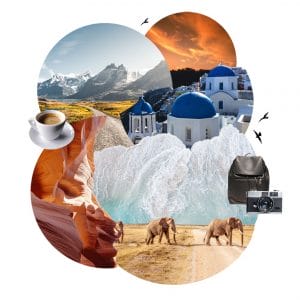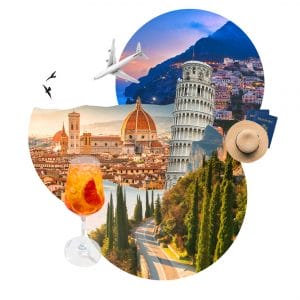These are not normal times. These are not normal times for the people of Wuhan, Milan, Seoul, New York, or any other region hit hard by COVID-19. And these times are not normal for those seeing the pandemic on the horizon, feeling the anxiety of battling the invisible enemy that’s rattling our world physically, emotionally, economically, and culturally. With the world under lockdown, and with increasingly stringent restrictions coming into place across North America, Europe, the United Kingdom, Asia, and beyond, many are asking how they can still plan travel—and have something hopeful to look forward to—in a time of ongoing and ever-accelerating shutdown.

Design by Ingrid Frahm, Getty Images
My 15 years as the co-founder of Black Tomato, a luxury trip planning firm, has taught me that our global community is defined by mobility, by the promise of exploring somewhere new, and by the small world that manifests each time we pack our bags and leave our homes. Of course, it would be irresponsible for us to recommend that you travel now, so we won’t. Instead, we’re going to provide clear and useful information and advice to help you plan for your journeys in the months ahead and into 2021. Of equal importance, we’re also going to provide the needed inspiration to get you there.
Put succinctly, we’re suggesting that you hold onto your trips and your travel dreams—not canceling but postponing, booking ahead rather than holding back. We’re recommending that you look ahead to the fall, to the window of September–December 2020, when the experts are predicting that things might ease off. As Northwestern University infectious diseases expert Dr. Robert Murphy put it, “Fall is the new summer.” While this is not a cast-iron guarantee, it does provide us with an informed timeline, a best-case scenario that we can plan toward and look forward to.
Wanderlust in all its forms is going to be the fast pass to finding our way back to the world again, and back to the people—from the family-owned restaurant chefs to the drivers, hotel concierges, locals, and guides—who make travel so worthwhile. To ease worries, answer questions, and put things into perspective, here’s how we at Black Tomato and Harper’s BAZAAR are thinking about travel in the months (and year) ahead.
HOW DO I PLAN FOR TRAVEL IN UNCERTAIN TIMES?
Many different travel restrictions of varying intensities are currently in place across the globe. At the time of this publication, gatherings of more than two people are prohibited in Germany and England. In Italy and France, one cannot travel more than 200 meters from their home without special permission from the authorities. Self-quarantines of 14 days are advised for anyone traveling to or from global hot spots. Argentina, Bolivia, Peru, and Colombia have closed their borders—and these are only some of the new orders put into effect over the past two weeks.
This situation is fluid, to say the least, and we expect that it will continue to morph, evolve, and react to the pandemic’s unpredictable ebbs and flows. Keep an eye on the Centers for Disease Control and Prevention (CDC), World Health Organization (WHO) and State Department websites. Staying informed—via direct, trusted sources—is the best way to keep abreast of the travel restrictions and bans as they happen (and disappear again).
While discretionary travel is currently ill-advised, any and all required travel (and leisure travel that takes place soon after restrictions are lifted) should be undertaken with holistic awareness of government policies—both of your own government and that of the country you’re intending to travel to. You can obtain this information via the CDC, but also directly from embassy and country websites. Many journeys and routes may not be accessible for many weeks or months, and those timelines may be extended as the disease spreads and wanes in various parts of the world. When booking ahead, read the fine print regarding the conditions of all your chosen carriers and suppliers to get clarity on change and cancellation policies.
The value of a trusted travel planner has never been more apparent. Third parties and DIY trips can quickly leave you exposed, laced as they are with hidden clauses and conditions. Many travel operators offer an entirely free consultation line and (especially now) markedly flexible travel options. Use those benefits to your advantage to minimize risk and deposit loss. Travel operators are best placed to do the legwork on your behalf, should you decide to change your dates or are forced to because of evolving circumstances. We are well-versed in planning trips with multiple, moving parts, as well as the behind-the-scenes legwork to transition them, seamlessly, to new dates.
We’ve currently pressed pause on travel, but it should be our common goal to come back to a world just as vibrant, inspiring, and ready-to-explore (if not more) once we press play.
What’s more, many travel designers and colleagues have already had much success in avoiding future hikes in rate adjustments for their clients during this current crisis, and will continue to find every way possible to ensure that booked trips, whether new or existing, are honored without unconscionable fluctuations. Most luxury hotel groups, like Belmond, have infused flexibility into their booking policies in the wake of COVID-19. “All guests with reservations for arrival on or before May 31, 2020, will be allowed to change or cancel without charge,” reads Belmond’s policy. “All new reservations booked between March 16, 2020, and April 30, 2020, for arrival on or before September 30, 2020, can be changed or cancelled without charge up to 7 days prior to arrival.” All of the above includes advance purchase rate and other prepaid reservations.

Design by Ingrid Frahm, Getty Images
TAKE EXTRA MEASURES: CONSIDER TRAVEL INSURANCE
Though this is not our area of expertise, we would recommend finding an appropriate provider at this time. Look closely at each provider’s clauses and conditions, and decide if they suitably cover events such as a pandemic. “This COVID-19 pandemic is proof-positive that disruptions can arise quickly,” explains Misty Belles, managing director of global public relations for Virtuoso.
Keep in mind, most insurance policies, which protect clients and vendors in extenuating circumstances, are in place to cover unforeseen circumstances, but not fear-based cancellations. “There is a wide array of insurance products to choose from,” Belles tells us. “Cancel for Any Reason or CFAR has typically been the most comprehensive, but now we’re seeing insurers pulling back on this type of coverage. The reality is that when COVID-19 first surfaced and people began canceling or postponing their travel plans, it was out of fear and not disruption. Insurance policies don’t cover fear-based decisions; they cover travel plans that are disrupted because you physically cannot take the trip, whether that’s medically related or because planes stop flying, cruise ships stop sailing, or borders are closed.”
A pandemic, as a result, can slip through the cracks of common policies, and should be addressed now, as well as moving forward. As Belles explains it, “Travel is an investment and, just like any other, you should protect it.”
CAN I STILL PLAN TO TRAVEL IN THE SUMMER?
The most important thing to note, at this time, is that we sadly don’t know. Circumstances could get worse, or they could get better, should our global community commit to battling this pandemic through testing, social distancing, and other CDC-advised measures (and we are hopeful for the latter). It’s only natural from the condition of isolation to think about summer travel, several months away. Come summer, some countries may find themselves safe, and routes may indeed open up, but it’s our responsibility to be prepared, and in turn prepare you, for the opposite.
This is an opportunity experience just how diverse and distinctive each of the world’s many countries are, and the best way to say good riddance to the borders which currently hold us apart.
Prepare a contingency plan for all the travel you have planned (or are planning) for the summer months, in terms of both timing and location. We may find ourselves needing to postpone travel altogether, but the likelihood is that you’ll find yourself itching to travel with limitations on where to go. Dream now about the places close to home that you’ve always wanted to explore, but never had the chance. Alternatively, think of how and when you would put this trip off in the future when things are more stable. Consider all the possible outcomes, ideally in collaboration with a trusted agent, and you’re less likely to face disappointment.
This might also mean planning a no-holds-barred staycation in your own city or region; it might also mean looking further afield, albeit from the perspective of your backyard. The United States is blessed with some of the world’s most spectacular national parks, wildernesses, and roads. From the stark and otherworldly landscapes of Utah to the mountain trails of the Midwest and the lush landscapes of the Pacific Coast Highway, these are places we should keep coming back to, especially when dreaming, planning, and plotting in this period of isolation.

Design by Ingrid Frahm, Getty Images
IS IT OK TO FLY?
Coronavirus won’t stop overnight. Rather, its spread will decline at different paces in different places. Should you begin a trip while the coronavirus is still active in certain parts of the world, there will be many things to keep in mind. As the CDC has observed, “because of how air circulates and is filtered on airplanes, most viruses and other germs do not spread easily.” Paul Tumpowsky, founder and CEO of Skylark and a leading global luxury travel air expert, agrees. “[I have] heard firsthand from leaders at every major international airline that the current level and extent of cleaning practices aboard aircraft is unprecedented,” he says. “Despite what the average consumer thinks, air filtration systems have always been very impressive (think hospital grade). My general recommendation for travelers is to take the extra step and always wipe down surfaces around your seat and tray table—these are the areas that most benefit from additional scrutiny to reduce unwanted microscopic stowaways.”
As for how air travel will look once the pandemic begins to subside, Tumpowsky thinks that airlines will be more flexible than ever before—for loyal customers and those who are first to book. “Hundreds of thousands of travelers are holding nonrefundable airline credits from postponed vacations and flight cancellations that have to maintain the original destination of travel,” he mentions. “Some of these credits are set to expire 12 months from the ticketing date, but [I think] the airlines will be flexible in some ways, like extending the credits’ expiration dates, but not others, like modifying destinations. This will lead travelers who have already spent the money to travel sooner, or at least, as soon as they can. Many of the airlines will likely extend elite frequent-flier status and benefits for some period of time in an effort to maintain loyalty with their frequent traveler base—but expect some of the fringe benefits that had just returned in 2018 and 2019, like free snacks in economy, to fall to the wayside.”
Keep in mind that while the risk of infection during air travel is broadly low, airports and other transport hubs should be navigated with care. Follow the best-practice advice offered by the CDC and WHO on how to minimize the risk of infection, whether you’re flying in the coming months or into the summer and fall.
HOW SHOULD I BE THINKING ABOUT TRAVEL NOW?
Now is not the time to travel. And yet, the travel industry—which includes everyone from major airlines to tiny street food vendors—is dependent not on your desire to travel and explore, but on your actually doing it. The spread of COVID-19, alongside its immediate health impacts, may cause untold damage to this vast, extremely diverse, and connected community. To put it more bluntly, and more passionately (because these are passionate times), if tourism is affected, then the countries, cities, establishments, and small businesses supported by tourism are also affected, as are the people and communities who make them what they are. We’re talking about the places and people we’ve fallen in love with—that valley in Mongolia, that farmer on the Faroe Islands, that local restaurant in the backstreets of Hokkaido—if we draw back now, then the world we reconnect with will feel incredibly, and perhaps forever, different.
Wanderlust in all its forms is going to be the fast pass to finding our way back to the world again, and back to the people—from the family-owned restaurant chefs to the drivers, hotel concierges, locals, and guides—who make travel so worthwhile.
Ultimately, when done sensitively and carefully, there is enormous value in planning now —and planning flexibly—for your travels ahead. Look to the near future, and look to fall or into the early days of winter 2021. Not only will you be ready at the starting gate when conditions do improve, but you’ll also experience that powerful psychological boost of having something uplifting and inspiring to look forward to. The time you’re now spending at home is the time to plan that trip of a lifetime, that journey you always thought of taking but never did, that honeymoon, that girls or couples trip—or even just an escape out of your ordinary and into the wide wilds just beyond it. There isn’t a single seasoned traveler or travel expert who will tell you to stop dreaming—because there’s no reason why you should.
And there is a real way in which you can help: showing confidence. By reaching out and engaging with the travel community, in whatever way you can and however you are comfortable, you’ll ensure we can continue to travel in the way we’ve known or dreamed of after all of this is over. In our 15 years of operating, we’ve built relationships with thousands of individuals and family-run businesses—from boutique hotels to one-man-shows, who have (quite literally) walked us and our clients through places unknown. Take the communities of Iceland, no strangers to disruption and catastrophe, who survived the 2008 financial crash and the eruption of the Eyjafjallajökull volcano that followed on its heels, only to rebound by welcoming tourism full force, and showing off the natural and cultural wonders their country has to offer. If they can bounce back from near demise, so can we.
The coronavirus epidemic is hitting all of us. It has done damage, and it will continue to do damage. But we can limit its impact in an act of impassioned solidarity. We can show faith in the world and in the people who inhabit it. For these people and their communities, each itinerary, planned trip, and future journey booked today will offer them real, tangible funds to stay afloat at a time when many are at risk of closing their doors for good. By simply dreaming of being somewhere else today, you can help these communities in a very real and practical way. The world would be a lesser place without its local communities, just as our own cities and towns would devolve should our independent stores, family businesses, local guides, and industries not weather the storm. Companies big, small, independent, and artisan will rely on the help of those who can pay today and travel in the months or even years to come.
We’ve currently pressed pause on travel, but it should be our common goal to come back to a world just as vibrant, inspiring, and ready to explore (if not more) once we press play.
WHAT ABOUT TRAVEL TO HOT SPOTS, LIKE ITALY?
From fresh pastas eaten and bespoke tailoring fitted in the bustling streets of Milan, an Aperol Spritz (or three) enjoyed on the majestic terrace of Grand Hotel Tremezzo on Lago di Como, and the grounds of Borgo Egnazia in Puglia, we have sent thousands of our clients to Italy over the years and have enjoyed its splendor ourselves. It is heartbreaking to see somewhere where we’ve felt so much joy become a place of such hurt and despair. But one thing’s for sure: As soon as those borders open, we’ll be packing our bags and heading back once again.
“It’s heartbreaking for me to hear people questioning whether they’ll ever take that trip to Venice, Rome, Tuscany—or Como, which holds a really special place in my heart,” BAZAAR.com’s travel director, Carrie Goldberg, shared as we were discussing the notes on this piece. “I’ll be on one of the first planes back to Milan when it’s safe and the borders reopen. The visions of those trips are what’s been getting me through the darker days of this period of isolation.”
With that in mind, fill your dreams with these visions: We’ll eat in the trattorias of Ostuni. We’ll drink espresso in the cafes of Matera. We’ll celebrate weddings, birthdays, anniversaries, and more with boats on the waters of the Amalfi. We’ll gaze at the mountaintops of the alps from the harbor in Bellagio, and we’ll swim in the hazy, turquoise waters of Polignano a Mare. These places and their people—warm, welcoming, passionate, irreplaceable—are our friends and most trusted local advisers. They rely on travel; it’s their lifeblood, and it supports their communities. As the World Travel & Tourism Council (WTTC) put it in its 2019 Economic Impact report, “Yet again, the strong economic performance of travel and tourism proves the power of the sector as a tool for governments to generate prosperity while creating jobs around the world.” A massive 319 million people across the globe rely on tourism. That is one in nine (or 50 million) jobs, and these are not jobs in the abstract. They’re the jobs of every hotel concierge, boat driver, and bartender in Italy, but also that acclaimed sushi chef in Tokyo, that expert guide on the isles of Lake Titicaca, that housekeeping manager in the Seychelles, and so many others in between. We have to ask ourselves the difficult question: How can we enjoy their homes if their homes are hollowed out?

Design by Ingrid Frahm, Getty Images
NOW IS THE TIME TO PLAN YOUR BUCKET LIST
We will travel again. And when we’re finally released from our self- and government-imposed isolations, we’ll feel the urge to travel like never before. We’re going to need a vacation, and the world will still be there as long as we look after it and support it.
Why not dream big for when that day finally comes? Dream up a journey that will transform and immerse you—whether that involves an inspiring physical feat like the ascent of Kilimanjaro or time spent learning about sustainable, local agriculture and traditional cooking in Peru from the people who practice those very lifeways. Think of a trip that will, in some small way, counterbalance the drama and uncertainty of these recent months, and chart a path ahead for the rest of your life. You don’t have to go all out, but you don’t have to go home either. That desire to travel—and to travel differently, roundly, and well—will always be there. Answer the call.
Revamp your bucket list. What of the wilds of Argentine Patagonia? A place of jaw-dropping, near-hallucinogenic beauty. Come the 14th of December, we hope to set up a luxury camp in one of its most dramatic, secret spots to enjoy the solar eclipse beneath one of the most spectacular skies in the world. What better way to shake off the cramp and smallness of isolation than to celebrate the magical world at our fingertips?
Or what of India—particularly during Diwali, its Festival of Lights. Taking place this year on the 14th of November, this enchanting, enriching celebration is a riot of color and sensuality. Picture every street washed in light; the Diwali fireworks, along with golden, bobbing lanterns filling the sky above the silhouette of the Mewar and Mughal-era City Palace. This vibrant and vast country, with so much to explore and experience, is perhaps one of the world’s most remarkable and otherworldly locations.
That desire to travel—and to travel differently, roundly, and well—will always be there. Answer the call.
Consider returning to Europe (and if you’ve never been, now’s the time to place it at the top of your list). Today, the continent is going through incredible turmoil, but you can help stitch together the cities of Budapest, Prague, Paris, Barcelona, Rome, Milan, and more in the most romantic fashion. Celebrate the 250th birthday of Beethoven in his home country; tour the chocolate factories and beer cellars of historic Brussels; stimulate every sense with a tour through the South of France. This is an opportunity to experience just how diverse and distinctive each of the world’s many countries are, and the best way to say good riddance to the borders that currently hold us apart.
This much is true: Though our borders are closed today, they will open again. We have seen the world, and we will see it again. But for now, let’s continue talking and sharing. Let’s make sure we show care and solidarity along with the communities, people, and places where we’ve been, and for those we are dreaming of from the solitude of quarantine. Place by place, and face by face, we’ll find that connection again—if we commit, responsibly and passionately, to doing so.
Tom Marchant is the cofounder of luxury travel company and trip planner Black Tomato, which delivers high-touch experiences around the world via inspiring itineraries and access to the globe’s up-and-coming, exclusive, and remote destinations. Marchant’s finger on the pulse of travel trends and the world’s best in hotels, restaurants, destinations, and honeymoons is unique and incomparable–and he’s sharing his expertise and curated lists of where to visit, stay, eat, and more in his travel column on BAZAAR.com.
From: Harper’s BAZAAR US



